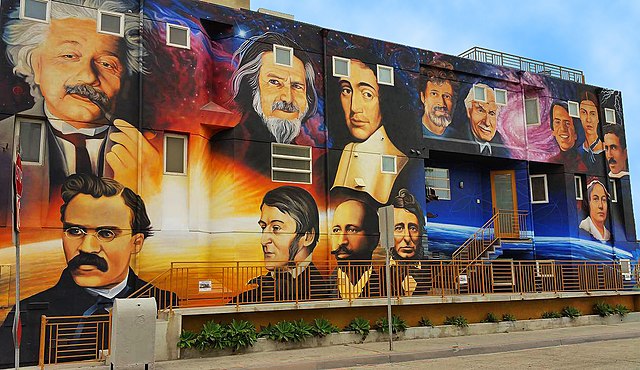1: Nietzsche: Behold the Man
2: Nietzsche and the Kaleidoscope of ideas.
3: The Zero Degree of Aquarius
4: Style and Substance: The Epigrammatic Nietzsche
5: Nietzsche: the Psychologist.
6: Love Hurts: The Eros-Chiron connection
7: Nietzsche’s Asteroids and Dwarf planets
8: Nietzsche: The Legacy
Video version here.
1: Nietzsche: Behold the Man.
It is hard to think of a man who is such a primary shaper of the modern age, yet who is at the same time so widely misunderstood than German philosopher Friedrich Nietzsche.
Taking another look at what Nietzsche said could be relevant for what transpires in 2023 and we are in the thick of it. Not only is Pluto now direct from October 10th – Nietzsche’s natal Sun is at 22° of Libra opposite Pluto in Aries and his chart aligns directly with the current Solar Eclipse of October 14th. His solar return is on the 15th. His sun conjuncts this Sun/Moon solar Eclipse on October 14th at 21° of Libra which is conjunct the South Node.
I feel he is back in view for a reason. In recent years Jordan Peterson has discussed Nietzsche’s ideas with a critical eye in his classes and videos. But there is also the popularity of podcasts such as Academy of Ideas EssentialSalts and the Machiavellians all of which help raise Nietzsche’s profile once again. Also, in dire times, an increasing number of people in 2023 are seriously weighing up their position in the universe. They are more likely to ask ‘why are we here?’ and ‘what is the truth?’
People turn to Nietzsche when all other advice fails. He delivers the goods in lightning flashes of illumination- Uranus conjunct Jupiter opposite Mars and Mercury both out of sign and an instinct-driven Moon in Sagittarius conjunct the North Node. His Mars is conjunct the MC set in warrior mode and able to spit forth fiery words like an dragon oracle. His chart is all Fire and Air and less Water and Earth and with several strong connections to the outer planets. And, while his pronouncements can be intense, as they dismantle the blinkers of encrusted beliefs, they also have the power to transform your worldview as fits his 29° Scorpio Ascendant and Sun opposite Pluto. This is self liberation and transformation on a scale not seen before him.
Some question this 29° Ascendant as it is so close to Sagittarius, which is more the ultimate philosopher. The birth time could have been rounded off. But it is exactly because Nietzsche was the psycho-physiological type of philosopher-who dissected the psyche with clinical precision that the Scorpio Ascendant could be accurate. Just look into those intense eyes- the famous thinker’s hard stare into the future offset by the handlebar moustache, but there in his First House. And when he encountered Dostoevsky’s work, he felt an immediate kinship. Dostoevsky was a Scorpio and psychologist too like Nietzsche.
 Nietzsche was born on the 15th October 1844 – and Libran suns generally seek equilibrium through artistic means, but they also cardinal and forceful. They have the power to recognise contradictions and stir up conflict.
Nietzsche was born on the 15th October 1844 – and Libran suns generally seek equilibrium through artistic means, but they also cardinal and forceful. They have the power to recognise contradictions and stir up conflict.
The eclipse on the 14th crosses the United States and down into Brazil but it happens in Australia on the 15th. Nietzsche has been dead for 123 years, but it falls on his Solar Return, and it also happens to be Nietzsche’s Venus return where Venus returns to the same point at 5/6° of Virgo where it was back in 1844. Venus rules the Sun and Moon in this eclipse but it is not so comfortably placed in Virgo next to Chiron, so there’s a suggestion of love struggles. But while Venus is in Virgo ruled by Mercury, it is Mercury that conjuncts the eclipse in Libra ruled by Venus, so there’s a dalliance of the two inner planets that could be mutually supportive.
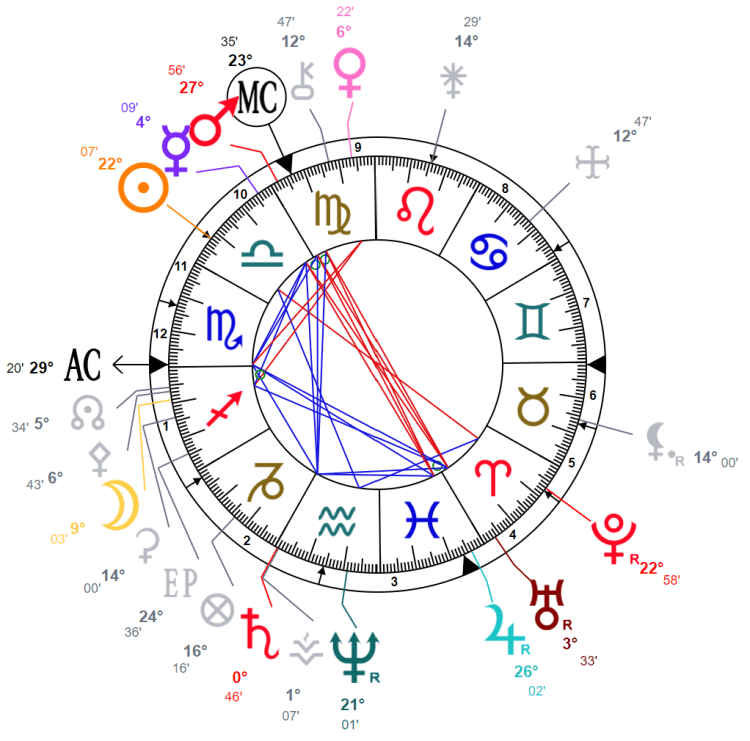
This mutual reception has a parallel in his chart as his Mercury placed in Libra was ruled by Venus making him also diplomatic in a legal sense able to disseminate how we are ruled by laws. I often see Venus-Mercury in configurations where writers have a persuasive way with words but in Nietzsche’s case it was in an out of sign conjunction with Mars in Virgo, so it came with a tremendous force that cut through to the core issues such as he unravelled the ‘genealogy’ of morals and made the infamous statement that ‘God is dead.’ But this was also massively triggered by the fact that his Sun opposes Pluto, and the North Node is now at 25° is transiting backwards to soon conjunct Nietzsche’s natal Pluto there at 22° also in Aries. That Nietzsche tends to split opinion into polarised viewpoints is not surprising as he also had an incendiary and iconoclastic Uranus also in that pioneer sign at 3° of Aries.
2: Nietzsche and the Kaleidoscope of ideas.
All I can do is point to some insights using astrology to peer into this complex, heroic and tortured character with a few hints at the proliferation of thoughts. I have always been instinctively drawn to his ideas and his willingness to ask as he said ‘strange, wicked, questionable questions’. I still have the same books by Nietzsche I started reading back in 1974. They got me into trouble in Catholic school from those who are fearful of ideas, and I was accused of ‘anarchy’ at school in the pre-punk days, but I see now his prescience and visionary qualities much more clearly. He was a seer of epic proportions and that is scary to some.
 One example is that his views on Psyche and Soma were way ahead of their time. It was Nietzsche who first articulated the need for reintegration of the mind into the body after the Cartesian splitting of the two. In Zarathustra he calls the body ‘a big sagacity’ and lambasts ‘despisers of the body’. He completely rejected body-mind dualism. He maintained that splitting mind from body was ‘An attack on the unitary picture of the self ‘and that the ‘The method of the Church is hostile to life’ as it is anti-passion and therefore anti-life. Passions can sometimes be stupid and blind, but they are also spiritual. This paved the way for today’s widespread use of holistic modalities and understanding that body cells can hold memory,
One example is that his views on Psyche and Soma were way ahead of their time. It was Nietzsche who first articulated the need for reintegration of the mind into the body after the Cartesian splitting of the two. In Zarathustra he calls the body ‘a big sagacity’ and lambasts ‘despisers of the body’. He completely rejected body-mind dualism. He maintained that splitting mind from body was ‘An attack on the unitary picture of the self ‘and that the ‘The method of the Church is hostile to life’ as it is anti-passion and therefore anti-life. Passions can sometimes be stupid and blind, but they are also spiritual. This paved the way for today’s widespread use of holistic modalities and understanding that body cells can hold memory,
Nietzsche was very much a master of the multiplicity of ideas- the Moon in Sagittarius/Uranus and Pluto in Aries. He could see and feel the whole picture – and fast- where others saw only chaos and held back. He suggested poetically that “you have to have chaos within you in order to give birth to a dancing star.” One of the reasons many authors writing about him despair is the challenge to find a consistent thread through his works. There’s a tumult of clashing themes that is kaleidoscopic and his multifaceted ideas cannot easily be reduced to simple equations and slogans for good reason- he was dead set against that tendency to oversimplify or wave flags for a cause.
3: The Zero Degree of Aquarius
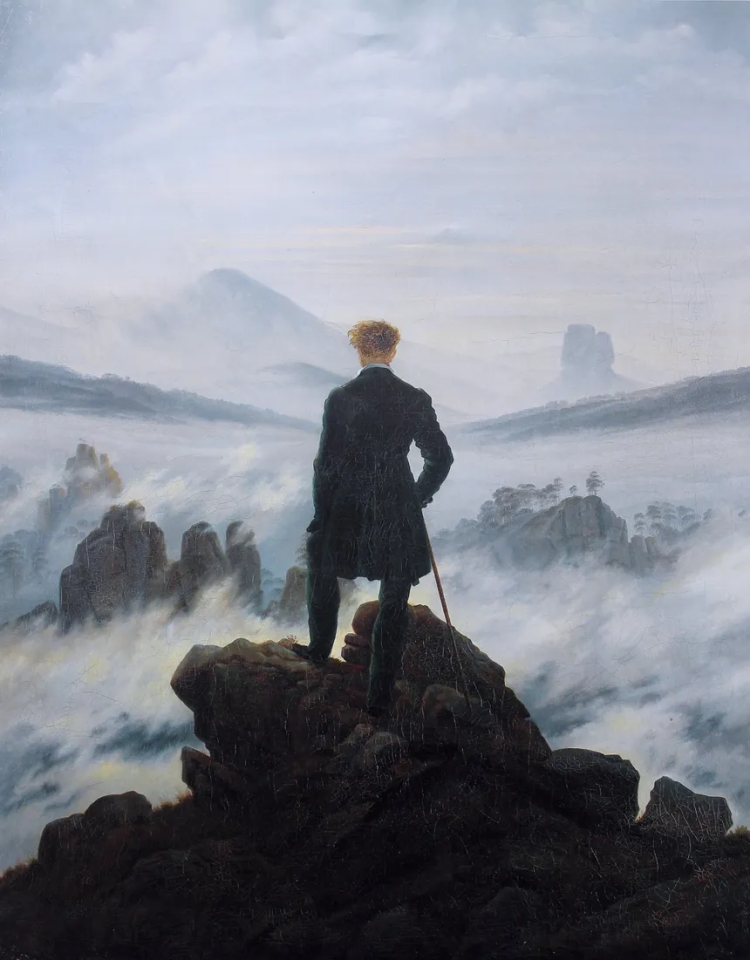
Nietzsche’s Saturn is at 0° of Aquarius, at the outset of a fixed sign representing progress, science, freedom and revolution. In his very first book, ‘The Birth of Tragedy’ (1872) Nietzsche explains how Greek tragedy and comedy and ‘amor fati’ (love of fate) can achieve the goal of coming to terms with the suffering life appears to dish out. He explains that appreciation of the tragic mode can help you leverage against meaninglessness and the relentless march of the scientific materialist viewpoint which dominates culture and the collective mind to the exclusion of all else. He believed this attitude of science ‘despiritualises’ people and they become lost to their own authentic and individual value. This is exactly the issue people are hotly discussing today with the introduction of generative AI associated with Pluto in Aquarius. AI vacuums up all personal data for its own use and yet appears to offer speedy and seductive ‘progress’.
In Nietzsche Unbound David Taffel writes “The problem of Science for Nietzsche is the problem of the value of the modern approach to existence and the modern understanding of knowledge and truth, one that he holds to have fundamentally nihilistic implications to which many humans seem cheerfully oblivious.”
The 0° point of Aquarius was the first time I noticed the Nietzsche connection to the major shift into Air signs with the Jupiter-Saturn conjunction of December 20th 2020 which was at this same degree and which was visible in the night sky to the naked eye. Is he being brought back into prominence as herald of this paradigm shift? It seems we are still living out Nietzsche’s prescient prediction that the West would fall into rampant nihilism. This despiritualising drive of the Science-Industry rides roughshod over the underlying human values which have deep and tangled roots.
Several moons of 2023 have landed on this point, or at 1°, and Pluto has been rolling over 0° of Aquarius for the last year or so staying there for two and a half months until June 11th in 2023. But it will go back there from January 22nd, 2024 to September 2nd, 2024, and then will move into Aquarius for 20 years. So these changes are upon us.
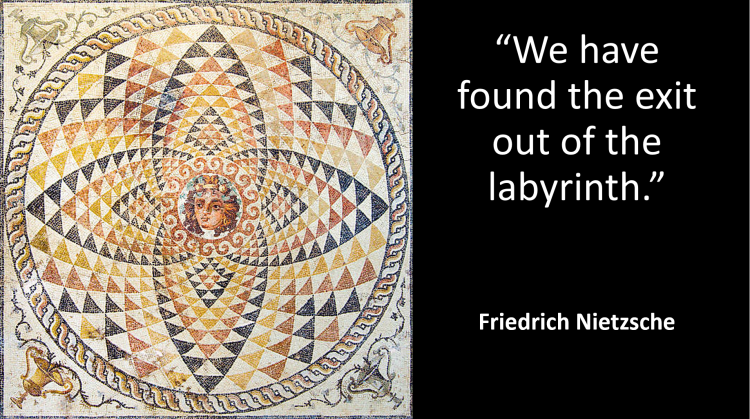
Such a massive emphasis on this point in the zodiac is asking us to pay attention to something important? When the Lunar Nodes finished up their stay in Taurus-Scorpio in July of 2023, they squared this same 0° Aquarius. So this placement tells us the zeitgeist is changing, and the rush to believe that science and technology will be our saviour as if it is a new god might not be such a good idea.
Again from Taffel (2003) “Nietzsche grasped the essence of modern/postmodern hypocrisy: Science only appears to be the disinterested pursuit of impersonal truths. In reality it is the pursuit of comfort, security and power. It has biased, practical goals and is unfazed by theoretical impediments. ‘Truth’ for Science is any belief that happens to promote its expansion.”
Nietzsche noted how often utopian beliefs tend towards dogma which becomes a mask for errors made where dishonesty is prevalent. In Beyond Good and Evil (1886) he said that the worst was to be sucked into duality. He challenged all metaphysicians to be honest about their allegiance to duality and opposed values which turns everything into the mush of dogma.
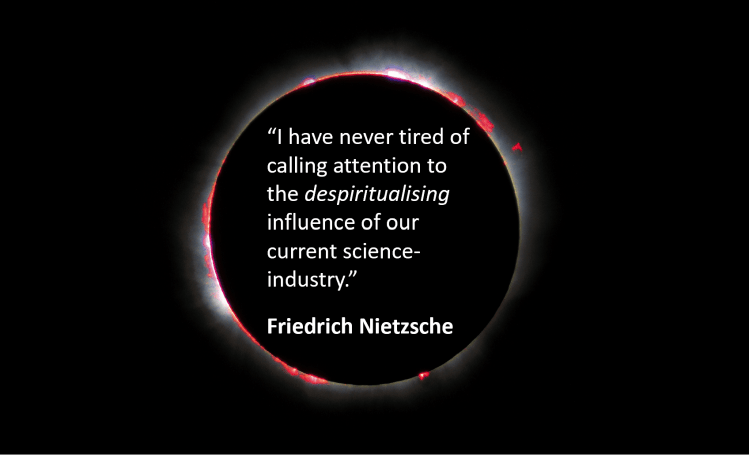
This Pluto in Aquarius heralds a new era, but is Pluto still pondering how power in this domain will unfold? Could it still be a force for good- the creation after the destruction? Or perhaps Pluto is asking us to see through the posturing of all these new tech systems? Saturn, the traditional ruler of Aquarius, is now also at the 0° point, but in Pisces at the time of the eclipse. It still has to plough through Pisces dissolving fixed structures along its path or toughening up the nebulous. It was the Saturn-Pluto conjunction of January 2020 that also kicked off a heavy set of transformations of society, not all for the good. The zero point suggests it is just at the outset of significant radical change in our viewpoints and a full conversation still needs to be had about how we feel about that.
Saturn, as ruler of Aquarius, might want to construct an ‘ordered’ society, but in those utopias, the human spirit of individuals is often crushed under a jackboot as all alternative views are silenced. This is all done in favour of a flattening mechanising process that is relentless, all with the intention of the ‘greater’ good- and when those societies fail as they inevitably do, Saturn, leaving the wreckage behind, has to go back to the beginning and start all over again. Pluto, on the other hand, in Aquarius is about to turn all these notions on their head.
Nietzsche saw all this kicking off in the 19th Century in the proliferation off ‘isms’ starting with Socialism. He consistently highlighted the dangers of socialism and egalitarianism which he claimed was the inevitable outcome of the Christian ethos and the notion of equality for all- leading to both Communism and Fascism as monumentally systematic overlays designed to force individuals to bow down to man-made social norms. He often just summarised this as the problem of ‘modernity’ itself.
Nietzsche’s Saturn denotes the ‘master’ speaking, but is not quite so bleak. It is rather elevated than stern demander of efforts. It is blessed by a trine to his Mars/Mercury crossing the cusp, and so stronger for that reason, and a sextile to Uranus, the modern ruler of Aquarius so takes inspiration freely where those two do not normally get on well.
4: Style and Substance: The Epigrammatic Nietzsche

You can read or re-read Nietzsche via his style on the one hand and via the substance on the other. But sometimes these two modes are indivisible and he achieves a marriage of thought and style- that is a delight to read as well as rich food for thought. Hence his reputation as a writer is deserved.
To return to what Nietzsche actually said and meant is not to rely on media spin about him and to remove the filters and read it afresh. There were many distorting lenses that took his statements out of context which is easy to do, as his style was aphoristic and epigrammatic. He delivers flash points of insight with economy of means. When in aphoristic mode, his words standout in high resolution, but do not cover the depth and range of the context out of which they grew. Only some of Nietzsche’s work is written in this aphoristic style- the rest varies in length in essay format. So it is easy to think that the popular quotes were all he thought.
In his chart we see the Uranus/Jupiter opposite Mars/Mercury as a signature for this skill at delivering his words- there is immense power combined here: of force (Mars in Virgo); stylishness (Mercury in Libra); numinous and paradoxical wisdom (Jupiter in Pisces); and sheer radical insight and originality (Uranus in Aries). This configuration sits across the 10th and the 4th axis and may explain why he is remembered much more for his forceful style in the aphorisms (Mars and Mercury in the house of reputation) than he is remembered for the depth and richness of insight (Jupiter and Uranus in the 4th House of self).
People think of him as a polemicist which he was, and he stated he did not want to become the guru, but he was that too. This is all on top of being the kind of writer that straddled worlds – literary, philological, psychological and philosophical that caused so many to be inspired by his work. In this powerful opposition the Uranus/Jupiter is sextile to Saturn and trine to the Mars/Mercury- and that alone can tell us how he was able to master this technique which is not surface style alone but also has solid substance. The Saturn is also in a wide T-Square to his Sun and Pluto.
Oscar Wilde– the other Libran and martyr to love – born ten years after Nietzsche- would do the same with epigrams but he had a much less heavy-handed lighter touch, and more symmetry and grace. Wilde’s epigrams had more elegance, and appeared more artificial. But uttered whimsically in upper class drawing rooms, could even be more subversive. But Nietzsche on the other hand used a sinuous, forceful, flexible style ( Mars in Virgo with Mercury in Libra, mutually supporting) which made good use of every available literary device to get his point across: sometimes flashy, sometimes brutally honest, sometimes quizzical, sceptical, punchy; and other times master of paradox, allusion and sustained metaphor. He even stated he knew he was able to state in one sentence what it took others the labour of a whole book to say.
He was heavily influenced by Rochefoucauld who was a Virgo with a stellium in Libra. This was the 17th Century French aristocratic author who wrote only aphorisms. The style of his one book ‘Moral Maxims’ exposed the deluded morals of the age as was a precursor to psychological analysis showing that people were often unaware of their darker more self-serving motives. So there is something about balance of style and the sign of Libra.
5: Nietzsche: the Psychologist

Nietzsche’s psychological acuity and depth was noted by all his contemporaries as he was the first of a kind of ‘psychological’ philosopher- check the Ascendant is at 29° of Scorpio, the most psychological sign at its ultimate end point. This is not to say psychology did not exist before him. He was highly profound in his analysis, even though he like many of that era overlooked that astrology which according to Jung, who studied the subject deeply, functioned as the ‘psychology’ of the antiquity.
He said he was the ‘psychological’ philosopher. Few would dispute this claim. Superficiality was abhorrent to him. His observations and analysis take a scalpel to society, its morals and its illusions about itself. There would have been no emergence of depth Psychology without Nietzsche as Adler (Aquarius), Breuer (Capricorn), Freud (Taurus) and Jung (Leo) –all cited him as a major influence. But psychology was in the zeitgeist then, aided no doubt by the numinous and deep Pluto-Neptune conjunction in Gemini throughout the 1890s.
Practically all modernist writers like Albert Camus (Scorpio) absorbed their main ideas from Nietzsche. He was seen as continuing the legacy of William Blake. Even D.H. Lawrence (Virgo) was called ‘the English Nietzsche’ as he recognised that Nietzsche’s ideas on the ‘Will to Power’ could be a two-edged sword: power has a good side, empowering people to fulfil their goals with energy and drive, and a negative side, sheer brute force which seeks only to manipulate and suppress.
Nietzsche already in the early 1880s talked most powerfully about the conscious and unconscious forces and drives that control human beings both in the individual and in the ‘collective’ -which he called the ‘herd’ He also has a lot to offer to astrologers in his writings, even though he was dismissive of astrology, being the arch sceptic that he was; he equated it with superstition, but was able to perceive it as having some positive relevance and meaning to the culture.
He often starts by dismantling an idea only then to retain some of its value. In his examination of ‘free will’ in relation to events that happen, he suggests they can be e accepted, and that amor fati -love of fate- can be your saving grace. This is encapsulated nicely by C.G. Jung’s famous remark “Free will is to do gladly and willingly that which you must do.”
6: Love Hurts: The Eros-Chiron connection
Venus conjunct Chiron according to Liz Greene suggests someone scapegoated in early life who is unable to forget that they did not receive genuine love. If they cannot get past this issue, they often create their own sense of isolation. On the other hand, Venus-Chiron can be positive in that their appreciation of beauty wrapped in difficult experiences is enhanced, and they themselves could be perceived as a ‘diamond in the rough’ by someone whose synastry constellates with their Chiron placement.
Marilyn Monroe had this conjunction across signs-Aries-Taurus and she suffered with poor self esteem. Love and pain go together sometimes even with a dash of poison too and these natives suffer excruciatingly for love. But there is perhaps a redeeming factor, an enlightened transformation that occurs through that, some catharsis? It defines sexuality as the most vulnerable area of life, and can end up teaching us the hard way.
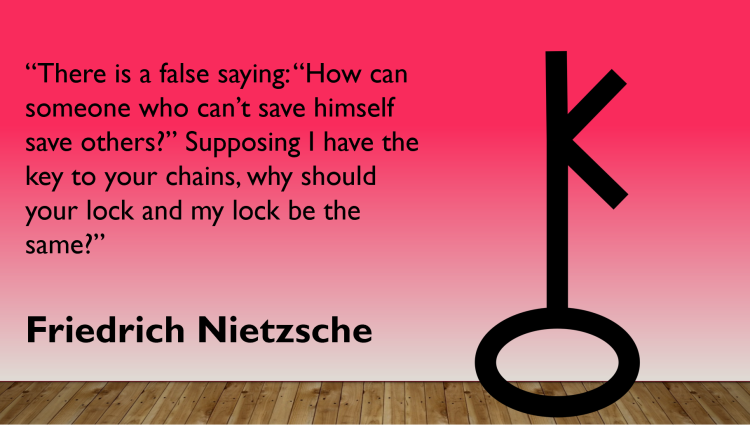
For Nietzsche it was even more complicated as his Venus/Chiron is in Virgo in the 9th House conjunct asteroid Eros as well, and square to his Moon/North Node in Sagittarius. It is linked to his beliefs and his highest mission to achieve the reevaluation of all values, a task he never quite completed. Chiron and Eros together would be some harsh lessons to have to learn in the love department, as Eros’s story with Psyche shows that he too had to learn to come down from his divine status to earth for the sake of Love- and Chiron could not heal his own wound.
This faces us with some injustice in life that must be endured. He did however believe that “The degree and kind of a man’s sexuality reach up into the ultimate pinnacle of his spirit. “ But also that this is a two-way process of spirit reaching down into sexuality.
But he also said that “The human being is too imperfect a thing. Love for a person would destroy me.”
And surely it would, so he made a conscious decision to avoid it. Sexuality and spirit being so intertwined made love affairs an area of acute frustration for Nietzsche and restrained his forays into love and passion with a sense of failure. He rated friendship more highly than marriage in any case. He made a sudden botched attempt to propose marriage and quickly gave up deeming it a miscalculation. Most likely he suffered not just over the well known ‘unrequited’ episode with Lou Salomé in 1882 but his other passionate friendships.
Lou Salomé was a precocious Russian intellectual born in 1861 an Aquarius sun sign. She was having an affair with Nietzsche’s best friend Paul Rée and she was only 21 when she met Nietzsche in Italy. Nietzsche’s sister Elisabeth loathed her. Salomé finally got to be alone with Nietzsche in late April that year in the Italian Alps and there were rumours of a ‘kiss’.
The astrological picture was fortuitous. There was a stellium of planets in Taurus: Neptune, Saturn, Chiron and Pluto- but Venus was there too that month- conjunct Chiron at 21°. That’s quite a heavy load of twisted agony if you consider Nietzsche’s natal Chiron was conjunct Eros and liable to give trouble in any sexual affair.
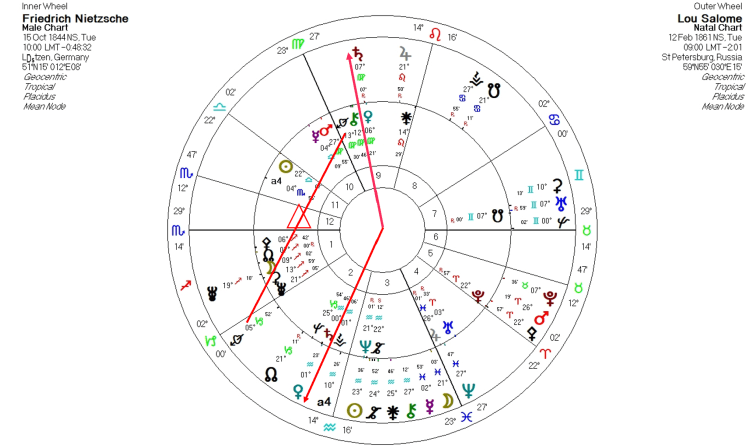
But the synastry of Lou Salome and Nietzsche’s charts has interlocking configurations. Not only was her Saturn on his Venus in Virgo, but her Venus was at 0° of Aquarius right on his Saturn emphasising the age gap- the mentor-acolyte side to the relationship. Everything said earlier about this 0° stands and germinated in this relationship of two iconic free thinkers of the modern era. His Saturn was solid and able to carry the flame of devotion as it was conjunct his Vesta too. His Venus Eros/Chiron in Virgo was trine to her Eros in Capricorn.
But not only that in early 1882 Nietzsche was experiencing fated moments as the North node returned to early Sagittarius to his North Node, and even more interesting – transiting Eros was conjunct Nietzsche’s natal Psyche which was on Lou Salome’s North Node. A galvanising encounter indeed. That they enchanted each other was clear and Nietzsche proposed marriage. Nietzsche was also perhaps thinking astrologically when he met Salomé as he remarked “From which stars have we been brought together here?”
But it was simply not to be as Paul Rée was in love with her too, creating a menage feel. And with Nietzsche the flirtation lasted only a few brief months. His longer friendship was with a woman called Mawilda von Meysenburg. Chiron with Eros in any chart points to acute sensitivity in love and sex. It is in Virgo so it comes with high expectations of being without blemish, but still with an earthiness and relish for the physical. Eros in Virgo just wants to do it ‘right’ by the book so reads the love manual. Chiron and Venus in Virgo might point to sixth house issues, daily rituals of nutrition and hygiene being a source of pain perhaps?

There’s a sense of the psycho-somatic here and repeated allergies and damage to the body, or even body dysmorphia. He may have had issues with the way he looked? Chiron’s dilemma was the old dilemma that the physician cannot heal himself and psychotherapists very often are able to help clients in therapy but their own personal issues are never resolved.
The glyph of Chiron actually looks like a key and I link this symbol to Nietzsche’s observation that “There is a false saying: “How can someone who can’t save himself save others?” Supposing I have the key to your chains, why should your lock and my lock be the same?” But that he also says that this dilemma of existence does not doom people to being without hope: “we have found the exit out of the labyrinth.”
The very persistent myth that he had syphilis is easily disproven as it it arose from the rumour mill, from those with little understanding of the disease. Also, there was a comical anecdote from his early life which he himself wrote about where he accidentally walked into a brothel in Italy and was so embarrassed he went straight to play the piano. This is not the same as someone who ‘frequented’ brothels and therefore had syphilis.
There have also been suggestions by biographers such as Köhler that Nietzsche could have been gay and that his work should be reinterpreted in this light to give a new understanding. If this were true, his love for Lou Salomé would then have to be cast more in the way of finding the right woman as a ‘beard’ i.e. to have a platonic relationship and sexless marriage to conform to social norms.
While this is possible, as when Lou Salomé did marry Carl Friedrich Andreas, it was a sexless marriage, it is not proven. Basically, the evidence from any remark Nietzsche made is very slim, just supposition, so this notion can be overlooked. In any case, it does not really change the power of his philosophy, nor is homosexuality visible in the natal chart.
 The relationship with Wagner (Gemini) however does warrant mention as it swivelled from love to hate and the synastry is revealing. Richard Wagner loomed so large in Nietzsche’s life as to cause a shadow. The young Friedrich was considered almost one of the family in the early days before the theatre in Bayreuth opened, and Nietzsche was close to Richard’s wife Cosima. Wagner later however made the mistake of accusing Nietzsche of masturbating too much and this rumour went around fast and tainted his reputation badly. How he could know by looking is never stated.
The relationship with Wagner (Gemini) however does warrant mention as it swivelled from love to hate and the synastry is revealing. Richard Wagner loomed so large in Nietzsche’s life as to cause a shadow. The young Friedrich was considered almost one of the family in the early days before the theatre in Bayreuth opened, and Nietzsche was close to Richard’s wife Cosima. Wagner later however made the mistake of accusing Nietzsche of masturbating too much and this rumour went around fast and tainted his reputation badly. How he could know by looking is never stated.
This was the cause of their alienation as Nietzsche could never forgive him, and one of Nietzsche’s last books ‘The Case of Wagner’ (1888) outlines this split. Nietzsche calls Wagner ‘decadent,’ ‘morbid’ ‘an actor’ good at ‘telling lies,’ ‘seductive’, ‘picturesque,’ a ‘Cagliostro,’ and ‘not really a musician at all’ and ‘everything he touches, he contaminates’. While it is entertaining to read, it is not very balanced for a Libran and sounds like the bitter words of the ex-disciple attempting to exorcise his former adulation. There’s a feeling of shadow-boxing going on here and of the father-son archetype gone badly astray.
Roger Scruton says Nietzsche himself is guilty of all the faults he accuses Wagner of having- perhaps so. And here’s where the synastry contains clues as to Nietzsche’s original worship of Wagner – Nietzsche’s Moon in Sagittarius is approaching Wagner’s Neptune at the Great Attractor point, so exerting a powerful and even hypnotic influence at 14° of Sagittarius. However, we see the estrangement and critique in that Wagner’s Jupiter in Leo, perhaps representing the father, is opposite his Mars and this opposition in Wagner’s chart lands on Nietzsche’s Saturn at the 0° of Aquarius- touchy, powerful, yet able to defend itself.
Wagner never commented on Nietzsche’s critiques in Nietzsche’s earlier books and he died in 1883, so it is not known if he felt sorry for abusing his former friend.
7: Nietzsche’s Asteroids and Dwarf planets
First, we see the asteroids Ceres and Pallas are conjunct his North/Node and the Moon rising in Sagittarius in the first House emphasising the wisdom of the hybrid creature, of the animal drives and human spirit fused into a bodymind. This was his personal challenge to achieve. Clearly, he had fully developed feminine instincts and contrary to what is often said, he supported women’s rights.
 But what of Nietzsche’s Neptune- the tendency towards the spiritual and the numinous? It is also in Aquarius but at 21° trine to the Sun so he could have made a great composer too to rival Wagner? Neptune is given even more symmetry and strength by being sextile to Pluto softening that harsh Pluto opposition to the Sun, and highlighting the importance of this 21-22° degree point. Neptune is conjunct asteroid Astraea, the star-maiden goddess of truth with acute feelings of what is right and wrong and an acute sense of honour. I think this just adds to the picture of how Nietzsche dissected all the falsehoods clustered around the conception of the ‘truth’ in order for us to become even more truthful.
But what of Nietzsche’s Neptune- the tendency towards the spiritual and the numinous? It is also in Aquarius but at 21° trine to the Sun so he could have made a great composer too to rival Wagner? Neptune is given even more symmetry and strength by being sextile to Pluto softening that harsh Pluto opposition to the Sun, and highlighting the importance of this 21-22° degree point. Neptune is conjunct asteroid Astraea, the star-maiden goddess of truth with acute feelings of what is right and wrong and an acute sense of honour. I think this just adds to the picture of how Nietzsche dissected all the falsehoods clustered around the conception of the ‘truth’ in order for us to become even more truthful.

Dwarf planet Orcus is on Nietzsche’s Ascendant at 29° of Scorpio. Orcus is linked to Pluto as the Etruscan god of the underworld. Orcus decided whether people kept their sacred oaths and dished out punishment for those who broke these solemn vows.
To return to his Neptune, it was said that Nietzsche might have read the ‘Baghavad Gita’ as he loved Schopenhauer who mentioned knowledge of Vedic and Buddhist texts. It is not known if he did read the Gita or not but he was taking a lot of Opium for his condition. Nietzsche chose Zoroaster as his model for the oracular voice in ‘Thus Spake Zarathustra.’ This was the prophet who sought to bring wisdom down from the mountain and restore a life-affirming attitude. This book, written when Chiron was conjunct Pluto and Saturn in Gemini, exemplifies the power of his writing to act as spiritual illumination and stands out as very different in style from his other books as it cuts across dualities. But it is also noted that Nietzsche ignored all the trappings and mystification of Theosophy and Madame Blavatsky, when he may have been aware of that movement gaining ground during the 1880s. I imagine had they ever encountered each other in person, it would have been a catastrophic collision.
 Asteroid Dionysus is conjunct his Mercury. It was his view that the Dionysian, irrational, cathartic force contrasted with the Apollonian, rational and intellectual, but that both fused together could help sublimate the Dionysian and transform it into high art i.e. tragedy and even comedy. This was the substance of ‘The Birth of Tragedy’ which had so impressed Wagner. Nietzsche’s favourite character from Shakespeare was Hamlet who is forced to make decisions that affect his fate and ends up being different in each scene. Hamlet is enigmatic; not the same at the end as he was at the beginning of the play and every actor plays him differently to different effect. This he sees as way of saying the self is plural not singular or continuous and that it is driven mostly by physiology.
Asteroid Dionysus is conjunct his Mercury. It was his view that the Dionysian, irrational, cathartic force contrasted with the Apollonian, rational and intellectual, but that both fused together could help sublimate the Dionysian and transform it into high art i.e. tragedy and even comedy. This was the substance of ‘The Birth of Tragedy’ which had so impressed Wagner. Nietzsche’s favourite character from Shakespeare was Hamlet who is forced to make decisions that affect his fate and ends up being different in each scene. Hamlet is enigmatic; not the same at the end as he was at the beginning of the play and every actor plays him differently to different effect. This he sees as way of saying the self is plural not singular or continuous and that it is driven mostly by physiology.
It is evident that he was an inspired writer and the greatest inspiration for writers is muse Calliope who stands in for Mercury. While the muse asteroid Calliope is not ultra close in orb- 4° away at 26° of Libra, I think nevertheless significant that Calliope is connected to his Sun in Libra that gave full force to his access to ideas filtered instantly out of the ether as if by osmosis.
8: Nietzsche: The Legacy
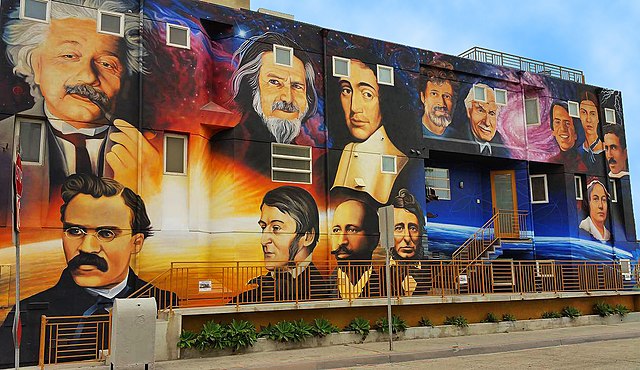
This all feels like it has only managed to scratch the surface of what Nietzsche has to offer. There’s a Jack-in-a-box feel to discovering Nietzsche as each idea jumps up to be examined brighter than the last. People in the 21st century may believe they are very post-modern, but they are not yet post-Nietzsche, as we have yet to come to terms with all he said and its impact is still to be absorbed fully.
But at this point near the Solar eclipse in Libra when Pluto is so strong as it stations forwards still square to the eclipse that points to his Sun, he feels nearby. It is a tense moment indeed which makes him all the more relevant, especially if you have degrees close to this 21° of Libra the intensity of the eclipse pushes you into something frighteningly new where we cannot find our feet easily.
German philosopher Heidegger called Nietzsche ‘the last metaphysician’ but he cannot be the last as we had all better be metaphysicians these days in order to see beyond the daily grind and do the work of un-blinkering our eyes. But he also had a very developed sense of aesthetics and how the artistic view of life can save us from the worst of this dull but relentless process of mechanisation and dehumanisation. He was still truly Libran sun sign to rate art so highly and in this therapeutic way. But as a Libran too, in the guise of Zarathustra he was the ‘Law breaker’ as well as ‘law creator’.
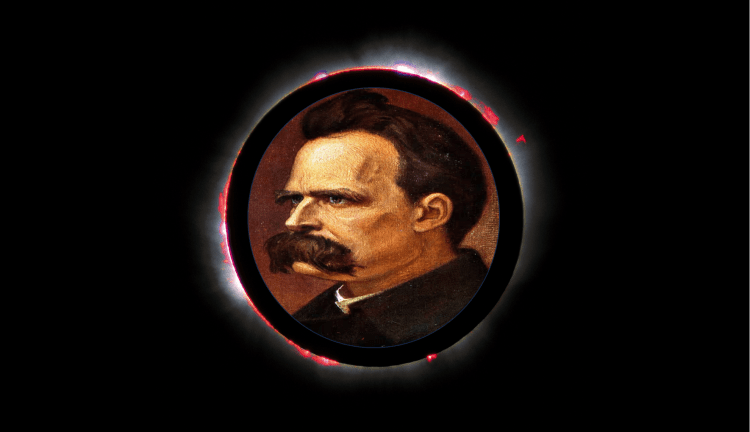
There is a heroic stance with Nietzsche that appeared to be punished by his eventual descent into madness. He was like the Prometheus bringing fire from the gods to the people (That Uranus in Aries) and as Goddard says he “dared to stand against the consensus of centuries, against the all consuming power of the collective.”
He seems also to ask us not to take the counterfeit view of life as real, not to place abstract impositions and rearrangements of the world as the world itself. Not to confuse the two. He said not to impose any mental schema on nature, but to remove all the life-denying constructs and just let life be more joyously what it is so you can dance over the nihilistic abyss instead of being swamped and overwhelmed.
This might refer to the October 14th Eclipse too where it is conjunct one of the brighter, happier Fixed stars Spica at 24° of Libra which Greek astrologers said “indicates those who are learned, philosophical, eloquent, creative, clever, artistic, pleasure-loving, high-minded and successful.”
It is very telling too that the major planets in his chart were retrograde: Jupiter, Saturn, Uranus, Neptune and Pluto were all retrograde at his birth time. I think he means he was able to slow down so much in his thinking he could begin the painful yet necessary methodical audit of all our received cultural norms and beliefs. So he wants us to review and reexamine all these beliefs ( Eclipse Sun and Moon conjunct the South Node) without ignoring their emotional roots with as free and clear a mind as possible, so as not to be deceived by ideologies and to bravely face what lurks underneath the encrusted surface.

Kieron is a London-based and trained astrologer at Proteus Astrology on Facebook and his home page: #
Also on Instagram and Twitter Gab, Telegram, Patreon, MeWe. and Tumblr Bitchute, Rumble and Odysee
Natal Chart Readings via Skype or Zoom.
Book a chart reading: Eusastro@protonmail.com
Astrology can help you to understand:
- life patterns, purpose and life path
- relationships, business and romantic
- money, and what it means to you
- career issues
- personal and spiritual development
- vision, hopes and wishes
- choices and decisions
- planning for the future
- health and well being, aligning your energies
- stimulating creativity
- the best places to travel and live
References
Goddard, G. (1998) ‘The Eternal Return of Friedrich Nietzsche: An Astrological Portrait.’ Island Astrology.net (Online) https://www.islandastrology.net/nietzsch/html
Greene, L. (2023) Chiron in Love; The Astrology of Envy, Rage, Compassion and Wisdom. Bournemouth. Wessex Astrologer.
Nietzsche, F. (1967) The Birth of Tragedy and the Case of Wagner, trans Walter Kaufmann, London: Penguin Vintage edition.
Robbins, M. D. (2023 ) ‘Friedrich Nietzsche: Philosopher ‘ Esoteric Astrologer .org (Online) https://esotericastrologer.org/articles/friedrich-nietzsche/
Taffel, D. (2003) Nietzsche Unbound: The Struggle for Spirit in the Age of Science. St Paul. Paragon House.

